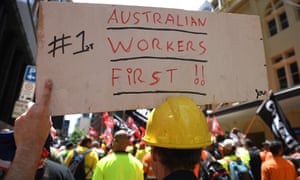Australia
is one of the world’s most affluent countries, but its wealth no
longer flows on to employees. How did things get so out of whack?
Wed
24 Oct 2018 15.05 AEDT Last modified on Wed 24 Oct 2018 15.23 AEDT
‘A
minority of Australian workers enjoy secure employment. Add to that
the millions of workers employed by other small businesses and you
have a growing proportion of the workforce who are unable to
collectively bargain for wage increases’ Photograph: Dan
Himbrechts/AAP
On
Tuesday, an
estimated 150,000 people took to the streets in Melbourne and
elsewhere, demanding that the federal government take action on the
wage freeze sweeping our country. For the first time in living
memory, workers are living through a low wage crisis. Since 2013,
their income has gone backwards. Meanwhile, profits are rising five
times faster than
wages.
When
he declared a low wage crisis in August 2017, Reserve Bank governor
Philip Lowe urged workers to
ask their boss for a pay rise. Having been commended for the
diagnosis but widely ridiculed for the suggested cure, Lowe is slowly
but surely changing his message. He told an audience of central
bankers in Portugal in June that when he questions Australian
business people about why they don’t pay more for highly sought
after workers, “they look at me as if I’m completely mad”. Lowe
has discovered that workers need to collectively bargain to secure
decent wage rises. In a speech to the Australian Industry Group, he
noted that changes in the bargaining power of workers were
contributing to wage stagnation.
Australia
is one of the world’s most affluent countries. Enormous wealth has
been generated by 27 years of consecutive economic growth. But it is
no longer flowing on to employees.
So
how did things get so out of whack? The answer is that the enterprise
bargaining system, the main way to negotiate a pay rise for workers,
is redundant. It is out of reach for the overwhelming majority of
workers and enterprise agreement coverage is in free fall.
The
system, introduced in 1993, was designed for workplaces that are now
in terminal decline; factories with lots of workers engaged in secure
full time employment. Large numbers of workers employed by the same
employer in secure jobs are well placed to collectively bargain to
secure higher wages. This form of work organisation became prevalent
after the second world war and peaked in the 1980s
"The
enterprise bargaining system, the main way to negotiate a pay rise
for workers, is redundant"
Since
then, the labour market has undergone a radical transformation.
Business has cut the cost of labour by getting out of the business of
direct employment and sourcing workers more cheaply through different
structures. Those structures include supply chains, labour hire
companies and franchising. A minority of Australian workers enjoy
secure employment.
Add
to that the millions of workers employed by other small businesses
and you have a growing proportion of the workforce who are unable to
collectively bargain for wage increases.
In
almost five years, the number of workers employed on an enterprise
agreement in the private sector has tanked by about 40%. Last year,
those numbers shrunk by
another 170,000 workers.
Enterprise
bargaining is useless for most employees of small business. Two or
three workers employed at 7 Eleven cannot effectively bargain for
wage increases. Each franchise is a separate enterprise with a
handful of vulnerable employees. The entity that calls the shots is
the 7 Eleven head office but the workers are not allowed to bargain
with it.
Gig
workers can’t bargain with an app. Casual workers have no
bargaining power. If they annoy the boss, they risk not getting
another shift. As we know these employees are vulnerable to predatory
and unlawful wage theft. How are they supposed to bargain?
Consider
also the lot of early childhood educators, low paid workers who have
tried to use the system. They have walked off the job six times in
the last two years. Overwhelmingly women, they are paid less than a
living wage for incredibly important work. Over 80% of the workers
are employed in small centres with an average of 15 employees. They
simply don’t have the bargaining power to obtain an enterprise
agreement, leaving them dependent on the safety net of award rates.
What
early childhood educators really need, like workers in franchises,
small business and labour hire, is an ability to come together and
bargain with the sector as a whole, to raise standards across the
board, and win fair outcomes. Sector wide bargaining is permitted in
a clear majority of wealthy countries.
The
workers pounding the pavement on Tuesday yesterday were making
demands that echo a growing economic consensus. Conservative
institutions that have until recently pushed policies that suppress
unions, bargaining and wage rises, are changing their message. The
OECD examined wages policies in 35 advanced economies over the
period 1980 to 2015. It found that countries that allow unions and
employers to bargain across a whole sector, covering many workplaces
and employers at once, significantly out-perform countries focused on
enterprise bargaining.
That
our workplace laws have not kept pace with changes in our labour
market is not a coincidence. Business lobbyists and conservative
politicians, both in Australia and the US, have promoted wage
suppressing policies very effectively for decades. As much was
recognised by the
Economist which argued in 2015 that: “The fundamental problem
is that in America, as in many other rich countries, employment law
has failed to keep up with the changing realities of modern work.”
We
need a modern system for the modern workplace that gives workers
employed across small, dispersed workplaces, often moving from job to
job, working for numerous employers over their career, an ability to
bargain for a fair wage rise.
•
Josh Bornstein is an employment lawyer and writer

No comments:
Post a Comment